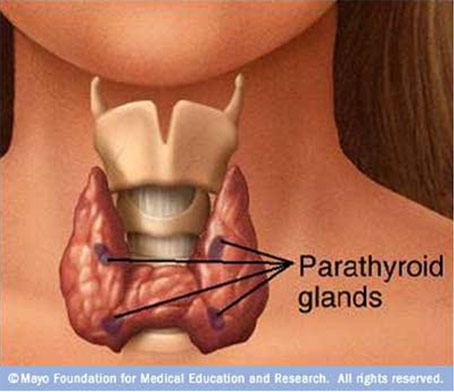- This information sheet is relevant to patients who have had parathyroid surgery
- The parathyroid glands help control the level of calcium and phosphorus in the blood
- The recovery period after this procedure is generally smooth and uncomplicated, however, an occasional situation may arise which may cause concern for you as a patient, parent or family member
- This page aims to provide general information and suggestions to help you following parathyroid surgery

What to expect following parathyroid surgery:
Activity
- Rest with limited activity at home for 24 to 48 hours after surgery
- You may bathe or shower, etc. as normal
- You should avoid bending, heavy lifting, straining and strenuous exercise
Healing
- A sore throat is common following this surgery from the breathing tube placed during surgery, and may last for around one week
- You may experience some nausea and vomiting which should improve after 24 to 48 hours
- You may have a low-grade fever under 38 degrees
- The incision will be covered with Steri Strips which will removed at your first post-operative visit
Diet
- Liquid is essential
- Start with ice cubes, sips of water or fruit juice then progress to a normal diet as tolerated
- You should be able to eat a normal diet soon after parathyroidectomy
Medications
- You will receive prescriptions for pain medications, antibiotics and possibly medication for nausea as needed
- Take pain medication as prescribed every 4 to 6 hours as needed
- Eating will be easier around 30 minutes after taking pain medication
Calcium replacement after parathyroid surgery
- The calcium level falls to normal within minutes after successful parathyroid surgery
- Sometimes the fall in calcium causes symptoms including:
- Tingling around the mouth and in the hands
- Cramping (“tetany”) of the hands and feet
- A temporary drop in calcium levels below normal also sometimes occur
- The calcium level is checked in hospital and, if it is normal, you will generally not need calcium supplements
- If the calcium level is low, you will be sent home on calcium supplements
- If you are sent home on calcium supplements, you will need to see your local doctor every
- week after discharge to have a blood test and to have the calcium levels checked
- If, at each visit, the calcium level in the blood is normal, then the dose needs to be reduced according to the attached protocol that needs to be given to your local doctor
- As a result of your surgery you may need to take calcium supplements – your surgeon will inform you of this at the time of your discharge
Contact your doctor if you have any concerns including:
- Chest pain
- Lightheadedness on standing
- Persistent vomiting
- Fever over 38.5 degrees
- Breathing problems
- Problems eating and drinking
- Progressive low neck pain
- Increased pain and tenderness not controlled by pain medication
- Numbness, tingling or twitching in the face or hands
Calcium supplement protocol
- Mild hypocalcaemia – Caltrate tablets only
- On discharge: Caltrate 2 tablets twice a day
- If the calcium level is normal at one week reduce to: Caltrate 1 twice a day
- If the calcium is normal the next week reduce to: Caltrate 1 daily
- If the calcium is normal the next week then you may cease Caltrate
- Moderate hypocalcaemia – Caltrate + Rocaltrol tablets
- On discharge they will normally be on: Caltrate 2 twice a day and Rocaltrol 2 twice a day
- If calcium is normal at one week reduce to: Caltrate 1 twice a day and Rocaltrol 1 twice a day
- If calcium is normal the next week reduce to: Caltrate 1 daily and Rocaltrol 1 daily
- If calcium is normal the next week reduce to: Caltrate 1 daily
- If calcium is normal the next week then you may cease Caltrate
If you have any problems after your parathyroid surgery, you should speak to your local doctor, who will arrange to contact your surgeon
Click here for more information about the parathyroid glands



